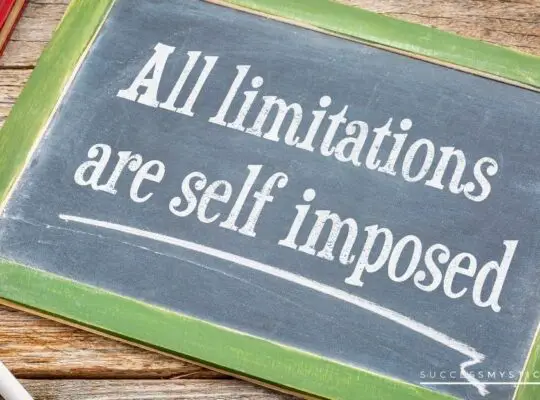If only you had a bit more willpower, if you could just exercise a bit of control… then you’d be able to push yourself over the finish line. If you had more self-discipline you could avoid the procrastination, quit your bad habits and vices, and really put yourself out there. That’s quite a bit you have placed on your self-discipline, isn’t it? Big expectations.
Self-discipline is simply the power to control your feelings, as well as the ability to overcome your weaknesses. We have built it up to be an elusive skill that everyone wants, but few people get.
A quick search on the web will throw up millions of websites, books, articles, and videos on the subject. There are so many different ideas and theories about how you can best go about acquiring this skill. The thing is, it isn’t complicated, but it is difficult.
In all honesty, there is no magic shot. You won’t find an easy trick to turn you into a master of self-discipline overnight. That’s generally what people are searching for when they type self-discipline into a search engine. You want that self-discipline immediately.
Often, people convince themselves that there is something complicated about the process. It must be complicated if it’s so difficult, right? That isn’t the case. There is a foolproof way to improve and develop your self-discipline.
Practice
Yes, it’s as simple as that.
Whatever you want to do, whatever you’d like to exercise your self-discipline in, whether it’s meditation or exercise, schedule it, make a plan, and ensure it’s non-negotiable. It sounds easy enough, but the reality is that it will probably be uncomfortable and frustrating. You may feel angry at times, but that discomfort will be brief.
Carve out thirty minutes every day to exercise, dedicate an hour to your writing, find 20 minutes for yoga and meditation. Before long, you will work through the dread you feel at getting it done daily and you’ll look forward to it. Then, in no time, it will be a habit that you don’t even need to think about.
There’s simplicity in truth and the truth is that we can only make little changes each day and it’s those incremental changes that build up to be something truly great. You can’t make drastic changes overnight; it will take time. Having said that, it doesn’t take quite as long as you might think it will. The beginning of the process is always going to be the most difficult.
However, as you embark on the process and time passes you can look back and see consistent progress over the weeks, months, and years. That is encouraging, that is motivation, and all of that goes to continuing to build and develop your self-discipline. It can’t start until you get the ball rolling. Once you do, once you get started, well you’ll need to do that thing every single day.
When it comes to adulting, the best thing is also the worst thing – you can do what you want. No one is standing over you to make sure you write that book report, no one will shout at you to do the dishes or run errands or get to bed on time. You get to create the life that you want to live. You choose what you do, or you don’t do.
You are completely responsible, 100%, for the life that you lead. It’s up to you to decide what you find important, and how you plan to fill your days. You have to prioritize, it’s up to you to build healthy habits. It may be tempting to make excuses and assign blame elsewhere. You may have had it tough; someone probably has it tougher.
You can choose to let it take you down or you can build yourself up instead. You can make excuses for your bad habits, you can come up with reasons for your lack of growth, and you can stay in the comfort zone. Or, you can work on your self-discipline and figure out what you’re truly made of.
The coolest part of self-discipline is that once you have it and you’ve established it in one area of your life, you can exercise it in every area of your life. It becomes easier and easier to build your self-discipline the more you progress. When you apply it, you will become more successful, more powerful, and this will help you stay motivated and inspired to chase your dreams.
One word of advice, though, don’t try to overhaul everything all at once. This will only provide you with endless frustration as you become overwhelmed by all the change. You are more likely to be successful when you take it one day at a time and focus on one thing at a time. The key is to choose one thing to develop and do it every day. When it’s solidified as a habit, you can add something else, and so on.
Okay, so we’re not going to leave you with just that one method of building your self-discipline because as effective as it is, you probably need to work on getting that one habit down. So, there’s some pre-work that you can do before you begin this journey.
15 Steps To Build Self-Discipline
1| The Why
Before you can embark on any journey, you need to know why you are doing it. It just isn’t enough to know how and what to do. Humans need to know the reason for the motivation, why we do something. So, before you can launch your self-discipline mission, ask yourself why? Why is this so important and if you don’t succeed, what will happen?
2| Long-Term Visualization
If you want a powerful tool to serve your motivation, then consider visualization. Visualize your life with the changes you expect to take place once you develop your self-discipline. In what ways do you expect your life to improve? What will life look like one year from now, five years from now, and even further into the future?
Long-term thinking is good, and when you visualize the positives that can happen like getting up early, working towards your goals and seeing yourself reach them, it makes you feel in control and that will help you move forward.
3| The Plan
This is where the first conversation we had comes into play. You have to create a plan. You spent time visualizing so, what are you doing to do in order to achieve your goal? Why is it so important for you to achieve them? You have seen the positive change that can come in your future now you need a plan. Envision your ideal future and create your plan by working back from that.
Take your end goals and break them into milestones. Remember, you’re only going to work on one thing at a time, and you can also change the plan and make adjustments if necessary. The point is that you keep your end-goal in sight and look at it any time you lack motivation.
4| Thanks, I Hate It
Remember how we mentioned that you may be uncomfortable at first, and you’ll probably hate it? Yeah, do something every day that you really hate. Once you get used to that, you’ll soon realize just how easy it is to build self-discipline. Well, it won’t be easy – but you’ll have a better perspective. So, think about doing the dishes or ironing. Something that has to be done, but that you put off. Use that chore hatred to improve yourself.
5| Cold Showers
This might just be the habit you do every day that you hate – kick off your day with a cold shower. It might not sound like the best way to start your day, but a cold shower boosts circulation, improves immunity, increases focus and alertness, as well as speeding up the recovery process of sore muscles. It may also relieve depression, according to the Virginia Commonwealth University School of Medicine (ref.).
6| Remove Temptation
Cast a critical eye over your life. Write out all of your bad habits and temptations, this could take a few days because you’ll probably forget some. Just add to the list as you come across more temptations and habits. This list isn’t a tool to demotivate you. It’s quite the opposite, it should be used to provide you with an awareness and insight into yourself.
You can use it to recognize the hard work to do, but the power is in understanding that you are in a position to change everything. Now, split your list by creating categories for your habits and temptations. Which of them fall into work life, what about finances, relationships, health, and social life? Categorize your list and get to work. Start with the quick wins to build your motivation and self-discipline. Remember, one thing at a time.
7| Build New Habits
Creating new, positive habits is quite similar to how you remove those bad habits and temptations. It’s fairly common to start strong in building new habits only for it to fall away as soon as your self-discipline is challenged. We’ve all been there, something sparks our motivation and then it disappears, leaving you with only your self-discipline to drive you. If you want to challenge yourself stay consistent as you try to create new habits.
You will come to a point in time where you don’t feel like doing it, do it anyway and with the same intensity as you did at the start. Repeating something, even when you don’t feel like it, is the key to developing self-discipline.
8| Morning Routine
Your morning routine should be challenging, and it should be productive. It’s the best way to set a positive tone for your day. You don’t want to start the day in chaos, it will only lead to a day of negativity. How can you be productive when you start the day in pandemonium?
Starting your morning off right will boost your mood and challenge you. You should have enough time to shower, dress, and enjoy breakfast, as well as light reading, exercise, meditation or yoga.
9| Time Management
We often limit ourselves with the convincing argument that we don’t have time to do this or to do that. Or, we’re just too busy to take on such a task. You might be a busy person, but that doesn’t mean you don’t have time to develop your self-discipline and improve your life. The truth is as busy as we are, we waste a lot of time. So, try to pay attention to how you spend your time each week.
Track absolutely everything and then review your list at the end of the week. Do you wake up and immediately check social media? You thought you were up earlier than normal, but suddenly an hour has gone by and you haven’t even showered. Ignore your phone when you get up. If it’s wasting your time, cut it out and replace it with a better habit.
10| Work First
Procrastination is your mortal enemy and learning how to overcome it will be a massive part of your self-discipline development. So, if it needs to be done, do it first, then you can enjoy downtime.
If you have children, this is an excellent one to role model for them. When they see you approaching life in this way, they are more likely to adopt this style.
For your kids, the best way to enforce it is to have them complete their homework as soon as they arrive home from school. There is no gadget time, playing or hanging out until it’s done and dusted.
11| Practice Problem Solving
This is a lot like tackling your work first. When it comes to problems, you shouldn’t avoid them or procrastinate. You need to solve them as quickly as possible, tackle them head-on. The ability to problem solve is a big part of self-discipline and you should practice your skills at every point. Even if it’s only a little problem, you should tackle it immediately before it has the chance to grow out of control.
This is another great thing to role model to your children, and it’s a life skill that should be exercised at every possible opportunity. Problems are like leaking pipes, they may start off small, but if you ignore it long enough it will easily grow out of control.
12| Healthy Eating
This might be the biggest ask of your self-discipline. Even those of us who eat well, face dietary temptations. We are faced with all kinds of temptation, especially when we run short on time and fast food is an easier fix. What you need is balance and healthy eating should provide you with that balance.
You can still enjoy treats, but for the most part, you should be focused on consistently eating well. Food is fuel, so are you fueling your body with premium fuel or pumping it full of diesel when your tank is unleaded? You will provide your body with useful energy when you eat the right foods, and when you don’t… well, you’ll only drag yourself down.
13| Monitor Progress
It’s important to monitor your progress. So, write out the different techniques and applications you’ve used to further your self-discipline. What worked and what didn’t? Monitoring your progress allows you time to reflect on how best to optimize your development.
14| Social Circle
The people you spend your time with shape who you are as a person. So, think of the people you spend time with. What are they known for? Do they eat poorly? Are they negative? Are they stuck in a rut? If the people you spend time with don’t try to improve themselves, will you? You need to spend time with self-disciplined people if you want to develop your own self-discipline. So, if there aren’t many of those people in your life, find some and introduce them to your circle.
15| Rest & Reward
How many people do you know that joke they’ll sleep when they’re dead? Probably more than you’d care to admit. In all honesty, sleep should be a priority, and one of the biggest ones. If you don’t sleep well, you will be less efficient. Rest is also important. When you are on the go constantly, working on your self-discipline, your mind and body need breaks.
Just enjoy a hot bath, meditate or do something that lets you truly unwind. You need the discipline to create and stick to a new sleep routine, it requires prioritization to optimize your sleep. It also requires discipline to get that rest you deserve. None of that will stand between you and your goals.
Developing your self-discipline is a lot like creating new habits and challenging yourself to improve each day. It’s not easy to create new habits so, when you do complete a challenge you should reward yourself. It helps you create a habit loop.
Creating habits forces you to endure a lot of discomfort, and you deserve to be rewarded. Don’t reward yourself with something that interferes with your goals. For example, if your goal is to lose weight, you shouldn’t reward yourself with food.
Often, self-discipline is considered a mark of good character or proof of a good upbringing. It’s definitely an admirable trait anyway. What most people don’t realize is that, like pretty much every other human trait, we all have it. Sure, some people have more of it naturally than others, but it’s not something that you can’t improve on or develop.
We may glorify it in our culture, but good people aren’t necessarily more disciplined than other people. There are a lot of people capable of terrible things who possess mountains of self-discipline. It’s a bit like a superpower in that sense. What self-discipline does ensure is a greater chance of success, of course, whether your goals are good ones or bad ones is entirely down to you. You should think of self-discipline as a tool.
When broken down to its very essence, it’s basically having the power to say no to yourself to serve your greater goals. Though, it’s important to understand that telling yourself no isn’t always an act of self-discipline. You probably tell yourself no all the time, and a lot of the time it’s out of obligation or due to fear. You may have chosen to eat healthily yesterday, but you only did so because there was no unhealthy option. If your no isn’t part of a larger commitment, then it’s not an example of self-discipline.
The presence of options is a really important element in developing your self-discipline. To develop it, you have to believe that there are other realistic choices available to us, ones that may be more gratifying in that moment.
Additionally, there needs to be an upside to choosing the other option because, in the long run, it will be more gratifying than the instant gratification of the other options. The second point is particularly important because a lot of people have trouble convincing their brains that forgoing pleasure now is beneficial for the greater good.
To put it another way, we view immediate gratification as a definite. That short burst of pleasure is guaranteed, but the long-term goal might not happen. How silly would you feel if you gave up that guaranteed pleasure in hopes of that long-term goal coming to fruition? Your brain isn’t wrong.
The future isn’t guaranteed, nor is that long-term goal providing you with that gratification. However, as painful as the thought of a missed opportunity is the long-term goal is much greater. The problem with your brain is that its smart enough to know it will have to delay that gratification repeatedly, for however long it takes you to achieve that goal.
Your brain is iffy, and unless you have a strong sense of self-esteem and trust in yourself, your brain might be capable of convincing you you’re making a bad decision and coax you into that burst of pleasure. Thankfully, with the advice above you can learn self-discipline and you can do it in small increments. You don’t have to dive in by resisting major temptations, it all starts with small steps.
So, start small. Come up with the smallest example of refusing yourself in order to service a larger goal. It might be rising five minutes earlier than normal or going to bed fifteen minutes earlier. It could be turning off screens and gadgets at 8 pm each evening or skipping coffee after 2 pm and replacing it with water. Think about one, little adjustment that you can make to tie into your larger goal and resist it. Take note of how it feels and how you think and feel as you try to resist. Those are your self-sabotaging thoughts that want you to give into gratification.
Final Thoughts
Not everyone operates on the same frequency so, there may be another way for you to tackle your self-discipline problem. Don’t be afraid to challenge your excuse making machine – the more you challenge them, the quicker you will eliminate the impulse to make excuses. Be honest, you can excuse just about any habit or behavior if you try hard enough. If you can reel off a long list of excuses for why you haven’t developed your self-discipline, you need to challenge them one by one.
We touched on rewards earlier, but you need to create a system. So, your reward can’t be something that you normally get. You have to remove the reward until you reach the point of reward, until the job is done.
Remain focused on results, don’t let yourself get caught up thinking about the reward or the difficulty you will have to walk through to get to it. You may end up inviting self-pity. So, the next time you face a must-do chore or task, you need to think about the benefits of completing the job. Then go for it.
It’s also important that you know the difference between wants and needs. Self-discipline isn’t limited to healthy activities. It reaches into every area of your life. It involves keeping yourself safe from temptation. Like, going on a shopping spree with a strict budget and choosing things that will exceed that number. That’s why understanding the difference between wants and needs is so important.
You have to prioritize what you need and still find a way to provide for your wants when you can. You need to exercise patience, especially when it’s something you can’t control on your own. You shouldn’t be afraid to ask for help. There’s more to self-discipline than knowing what should be done, it’s also about knowing when to ask for help.
Without discipline, talent is useless. You may experience a lot of movement, but movement isn’t always productive if it isn’t propelling you forwards. If you know that you’ve got the talent and you move a lot without getting results, then there’s a good chance your issue is self-discipline. Let’s get started right now, what do you have scheduled for the day?
Do any of your activities require a measure of self-discipline? Perhaps exercising, self-care or healthy eating? It’s easy to skip out on these types of things, especially when your plate is full. Yet, they’re incredibly important and you need the self-discipline to do them. So, focus on the benefits of those behaviors and how those habits would improve you.
When you schedule your calendar, make sure that you include plenty of self-discipline activities that will help you achieve your goals. Don’t give up, create habits and be consistent.







